高中英语人教版必修2 Unit2 The Olympic Games Period2 Reading要点讲解课课件 (78张)
文档属性
| 名称 | 高中英语人教版必修2 Unit2 The Olympic Games Period2 Reading要点讲解课课件 (78张) | 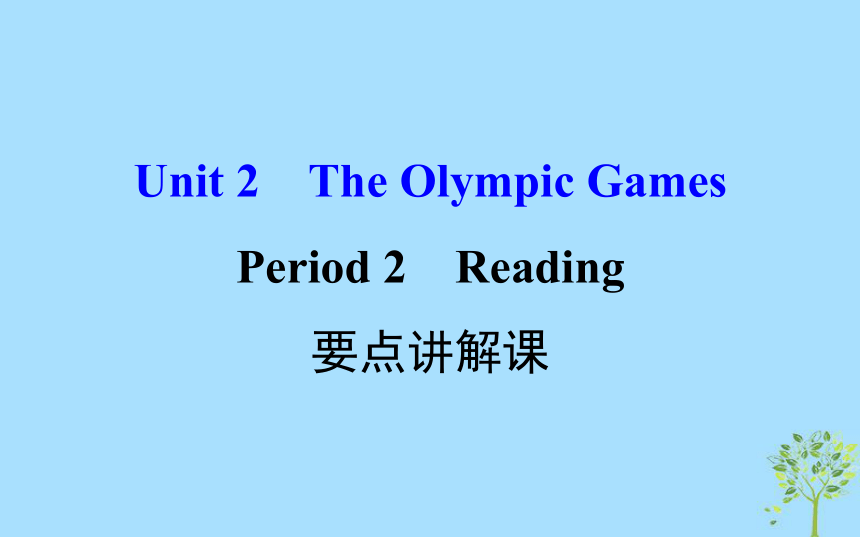 | |
| 格式 | zip | ||
| 文件大小 | 827.3KB | ||
| 资源类型 | 教案 | ||
| 版本资源 | 人教版(新课程标准) | ||
| 科目 | 英语 | ||
| 更新时间 | 2019-02-20 16:29:19 | ||
图片预览

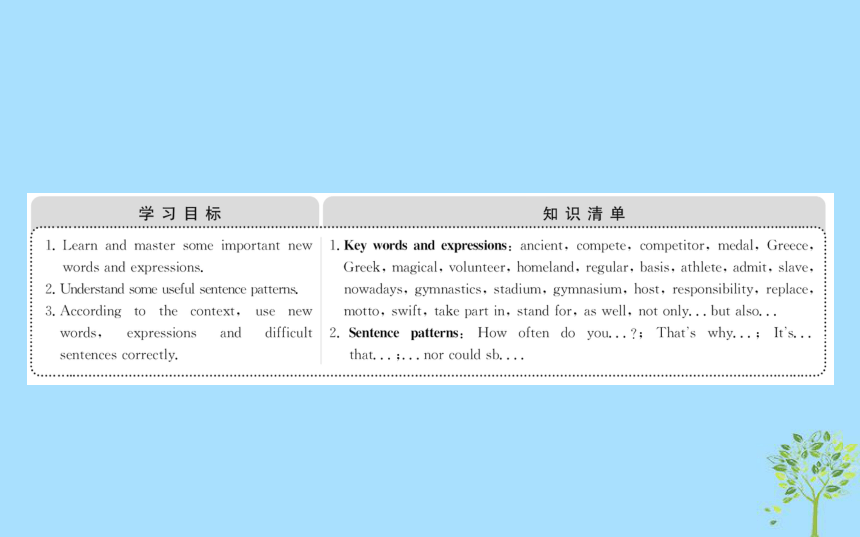
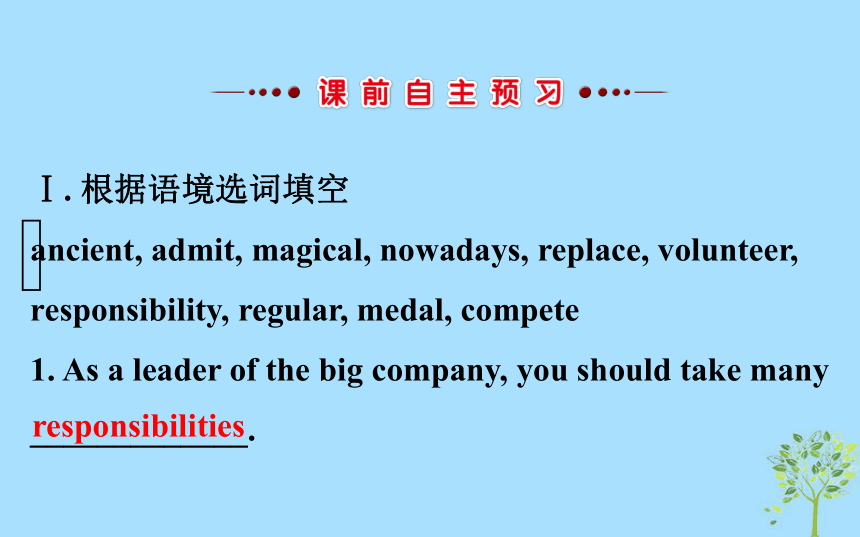
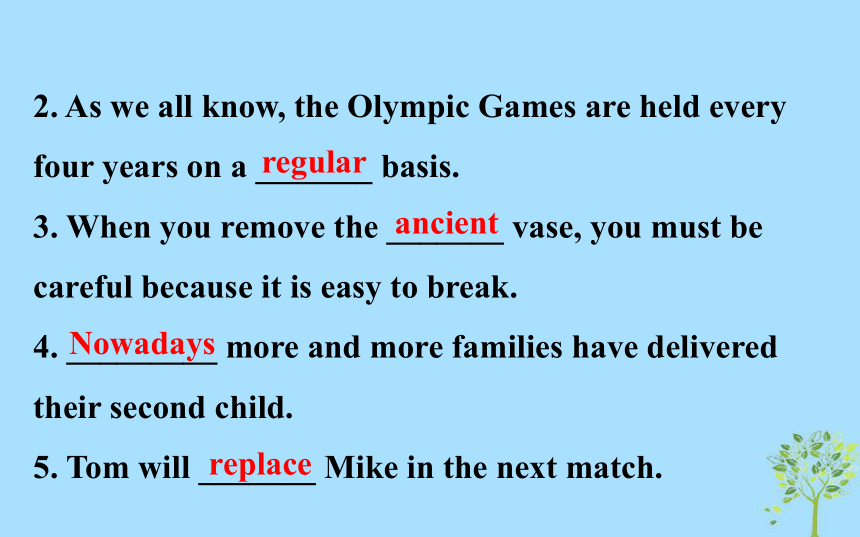
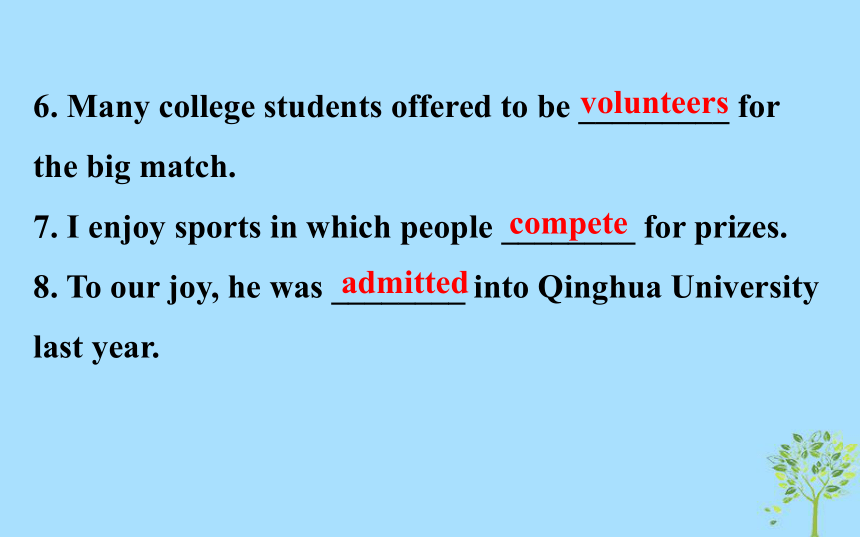
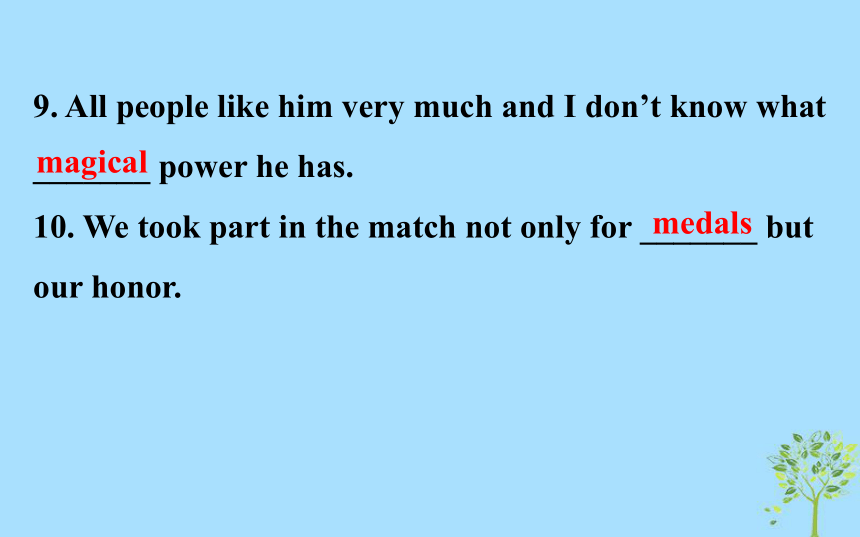
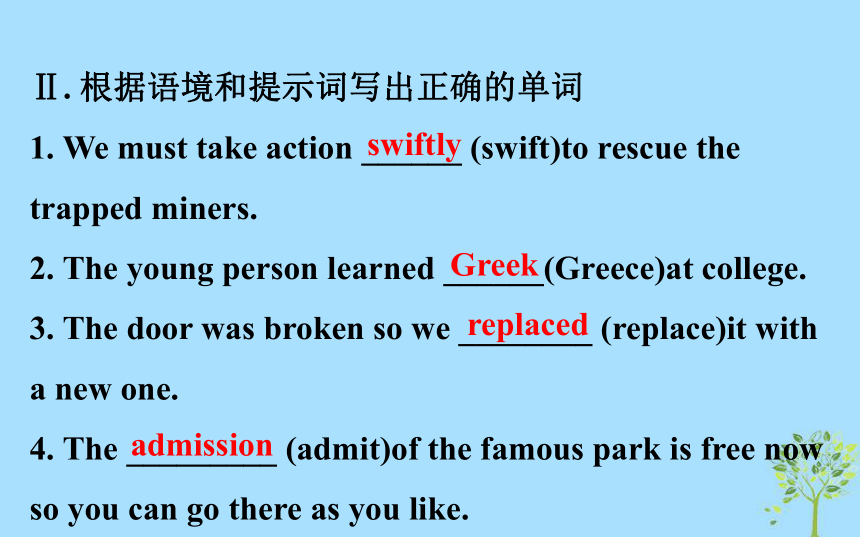
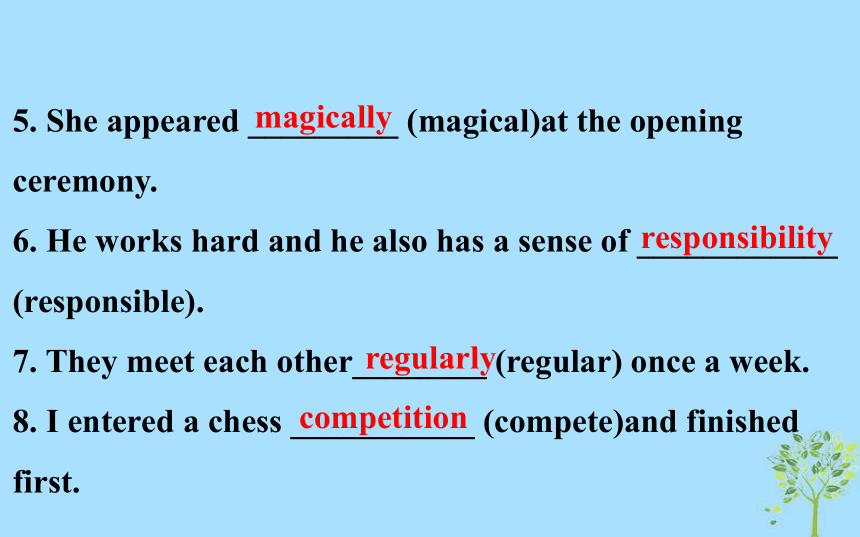
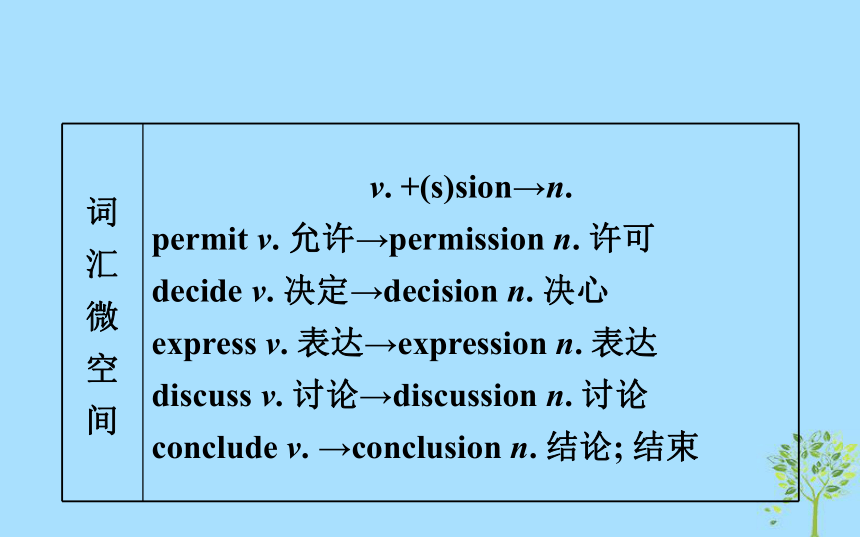
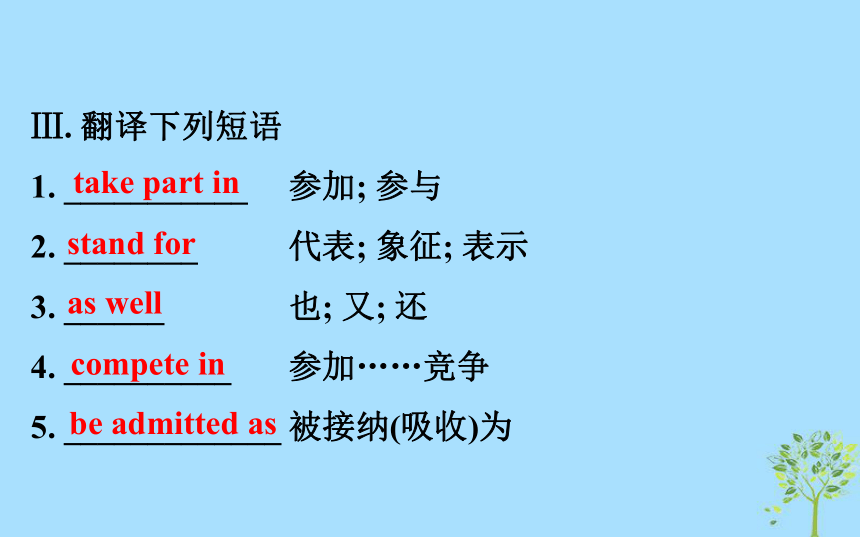
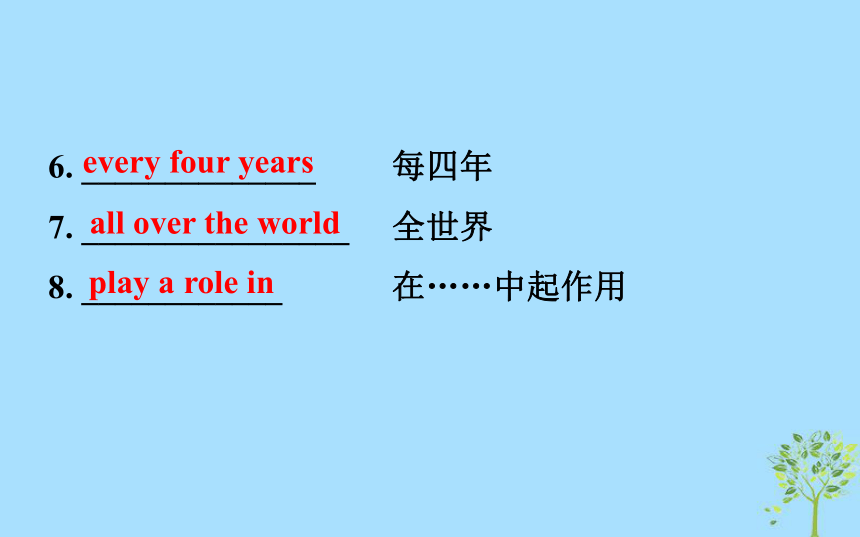
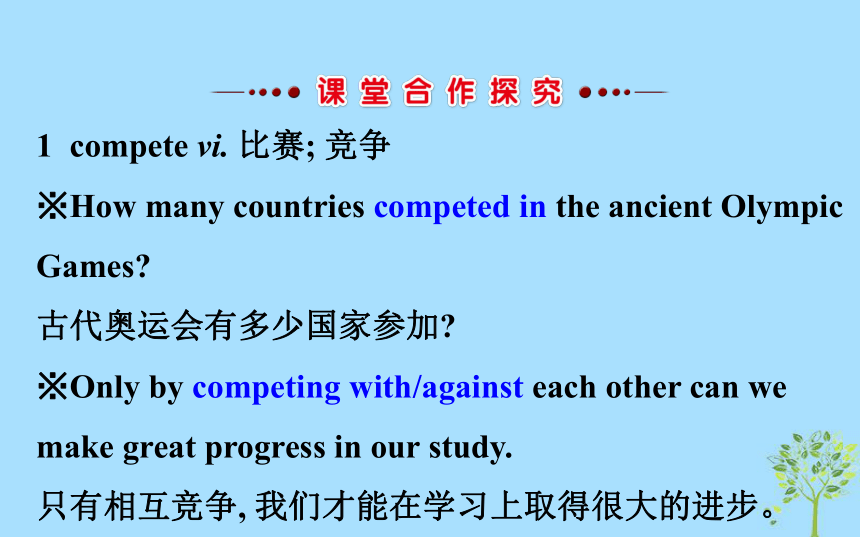
文档简介
课件78张PPT。Unit 2 The Olympic Games
Period 2 Reading
要点讲解课Ⅰ. 根据语境选词填空
ancient, admit, magical, nowadays, replace, volunteer,
responsibility, regular, medal, compete
1. As a leader of the big company, you should take many
_____________. responsibilities2. As we all know, the Olympic Games are held every
four years on a _______ basis.
3. When you remove the _______ vase, you must be
careful because it is easy to break.
4. _________ more and more families have delivered
their second child.
5. Tom will _______ Mike in the next match. regularancientNowadaysreplace6. Many college students offered to be _________ for
the big match.
7. I enjoy sports in which people ________ for prizes.
8. To our joy, he was ________ into Qinghua University
last year. volunteerscompeteadmitted9. All people like him very much and I don’t know what
_______ power he has.
10. We took part in the match not only for _______ but
our honor. magicalmedalsⅡ. 根据语境和提示词写出正确的单词
1. We must take action ______ (swift)to rescue the
trapped miners.
2. The young person learned ______(Greece)at college.
3. The door was broken so we ________ (replace)it with
a new one.
4. The _________ (admit)of the famous park is free now
so you can go there as you like. swiftlyGreekreplacedadmission5. She appeared _________ (magical)at the opening
ceremony.
6. He works hard and he also has a sense of ____________
(responsible).
7. They meet each other________ (regular) once a week.
8. I entered a chess ___________ (compete)and finished
first. magicallyresponsibilityregularlycompetitionⅢ. 翻译下列短语
1. ___________ 参加; 参与
2. ________ 代表; 象征; 表示
3. ______ 也; 又; 还
4. __________ 参加……竞争
5. _____________ 被接纳(吸收)为take part instand foras wellcompete inbe admitted as6. ______________ 每四年
7. ________________ 全世界
8. ____________ 在……中起作用every four yearsall over the worldplay a role in1 compete vi. 比赛; 竞争
※How many countries competed in the ancient Olympic
Games?
古代奥运会有多少国家参加?
※Only by competing with/against each other can we
make great progress in our study.
只有相互竞争, 我们才能在学习上取得很大的进步。※Tom competed with/against five other athletes for the first prize in a race.
汤姆在赛跑中与另外五名运动员竞争第一名。【自我归纳】
①compete __ 参加……比赛/竞争
②compete ___________ sb. /sth. 和……对抗
③compete ___________ sb. ___ sth.
为得到某物与某人竞争inwith/againstwith/againstfor【知识延伸】
competition n. 比赛
competitive adj. 有竞争力的
competitor n. 比赛者; 竞争者; 对手【活学活用】
语法填空。
①Small shops cannot compete __ prices with big ones.
②My handwriting can’t compete ____ his.
③He was clever enough to compete ___ the maths
scholarship. inwithfor④(2016·江苏高考)His uncle tells him that if his cousin
wins the ___________ (compete), the family will win an
overseas tour for free.
⑤The two girls _________ ___________ each other ___
(为……与……竞争)the first prize in a singing
competition. competitioncompetedwith/againstfor2 take part in 参加; 参与
※(2017·全国卷Ⅲ)But Sarah, who has taken part in shows along with top models, wants to prove that she has brains as well as beauty.
但是Sarah已经和一些超模参加过演出了,她只是想证明自己既有美貌又有头脑。※All the League members took part in the meeting, at which ten students joined the League.
所有团员都参加了会议, 在会上10名学生入了团。 ※Will you all join in singing the song, please?
请大家一起来唱这首歌, 好吗?
※I will attend my cousin’s wedding ceremony next Friday.
我下周五将参加我表兄的婚礼。【易混辨析】 take part injoinjoin(sb. )inattend【名师指津】take part in短语中冠词的使用
take part in是惯用词组, part前一般不用冠词, 但part前有形容词修饰时, 要用不定冠词。例如: take an active part in积极参加。 【巧学助记】“参加”不同的活动【活学活用】
①Women are now ______ ___ _____ ____ __ social
activities.
妇女现在正积极参加社会活动。takinganactivepartin②选词填空(join/join in/attend/take part in)。
I enjoy ____________sports. I want to ____ the football
club when I grow up and often ______ its meeting. But
now I can’t ____ others __ playing football because I
have much homework to do. taking part injoinattendjoinin③The people who have ______ the club have a chance
__ ______ the opening ceremony.
加入这个俱乐部的人有机会参加开幕式。joinedtoattend改错。
④All those who want to take part in, please raise your
hands. ( )
⑤We should take active part in regional economic
exchanges and cooperation. ( ) 去掉intake后加an3 stand for 代表; 象征; 表示
翻译句子, 体会stand for在语境中的含义。
①What do the five rings on the Olympic flag stand for?
________________________
②Pigeons stand for peace.
_______________奥运旗上的五环代表什么?鸽子象征和平。【知识延伸】
stand out 引人注目, 脱颖而出
stand by 支援; 站在……一边; 袖手旁观
stand up 站立, 起立
stand aside 让开; 站到一边
stand back 退后【活学活用】
用stand的相关短语填空。
①(2016·全国卷Ⅰ)With a code book, you might write
down words that would ________other words.
②Red flowers ________against the white snow.
③How can you ________when she needs help? stand forstand outstand by④The olive branch ______ ___ peace.
橄榄枝象征着和平。
⑤I don’t have to stand for such rude behavior.
译: ___________________________standsfor我不必忍受如此粗鲁的行为。4 admit vt. &vi. 容许; 承认; 接纳
※She was admitted as a member of the club.
她被批准为俱乐部成员。
※Study hard and you’ll be admitted to/into Beijing University.
努力学习, 你会被北京大学录取的。※He admitted breaking/having broken the school rules and willingly accepted punishment.
他承认违反了校规, 愿意接受惩罚。
※You must admit the task to be difficult.
你得承认这项工作是困难的。【自我归纳】
①be admitted __. . . 作为……被接受
②be admitted ______ 获准进入; 被……接纳
③admit+ ________________ 承认……
④admit sb. /sth. _____. . . 承认某人/某物是…… asto/intodoing/having doneto be【巧学助记】
形象记忆admit 【活学活用】
①We ________ her ______ our club.
我们已经准许她加入俱乐部。
②Tom ________ ______ _____ many spelling mistakes
in the composition.
汤姆承认在作文中犯了许多拼写错误。admittedto/intoadmittedhavingmade③How many students have _____ ________ ____ the
school this year?
今年这所学校录取了多少学生?
④The hall ____ ______ about 1, 000 persons.
这个大厅能容纳约1 000人。
⑤She admitted to be easily annoyed. (改错)
___________beenadmittedintocanadmitto be→being5 as well也; 又; 还
翻译句子, 体会as well在语境中的含义。
①I can play the guitar, and I can sing as well.
__________________________
②He knows Russian as well.
_____________我不但会弹吉他, 还能演唱。他也懂俄语。【易混辨析】 【名师指津】as well as用法两点通
(1)as well as用作连词, 连接两个并列的成分, 如名词、形
容词、动词、介词等, 通常不位于句首。此时as well as
强调的重点在前面, 不在后面, 意为“不但……而且……;
既……又……”。翻译时要先译后面, 再译前面。
(2)当主语含有as well as时, 谓语动词需和as well as前面
的主语在数上保持一致。 【活学活用】
选词填空(as well/as well as/too/either/also)。
①He is a scientist, but he is a poet ______.
②You may ____ find that reading has become more fun
than work!
③I’m learning French ________English.
④My mother is a teacher; my father is a teacher, ___. as wellalsoas well astoo⑤If you do not go, I shall not go _____.
⑥He sent me some clothes and much money __ ____.
他寄给我一些衣服, 还有许多钱。
⑦We shall march by night __ ____ __ by day.
我们白天黑夜都要行进。eitheraswellaswellas⑧He as well as his classmates have read the novel. (改错)
( )
⑨I have been to New Zealand as well.
译: _________________have→has我也去过新西兰。6 It’s in the Summer Olympics that you have the running races, together with swimming, sailing and all the team sports.
跑步、游泳、划船和所有的团体项目是在夏季奥运会上进行的。 【句型剖析】
(1)本句是一个强调句, 强调状语______________________。
(2)强调句的基本结构是: ________+被强调内容+________
+其他, 强调主语、宾语和状语; 若强调部分为人, 既可用
____也可用____; 若强调其他只能用____。 in the Summer OlympicsIt is/wasthat/whothatwhothat①(2016·天津高考)You are waiting at a wrong place.
__ __ __ ___ _____ ____ the coach picks up tourists.
你等错地方了。这辆长途客车是在宾馆接游客的。
②__ ____ after he got what he had desired ____ he
realized it was not so important.
得到他梦寐以求的东西后他才意识到一切都没有那么
重要。 ItisatthehotelthatItwasthat③__ ____ Chinese women’s volleyball team ____ won
the gold medal in the Olympic Games.
正是中国女排赢得了奥运会金牌。 Itwasthat【知识延伸】
(1)强调句的一般疑问句形式为: Is/Was+it+被强调部
分+that/who+原句中其他成分?
(2)强调句的特殊疑问句形式为: 疑问词+is/was+it
+that/who+原句中其他成分? 【名师指津】你会识别强调句吗?
识别强调句的方法是去掉it is/was和that/who, 在不增减其他词汇的情况下, 通过适当调整语序或不调整语序, 意义基本不变且语法结构完整, 就是强调句型。【联想拓展】
若强调谓语动词则需借用助动词do/does/did, 现在时用“do/does+动词原形”; 过去时用“did+动词原形”。意为“的确, 确实”。
※I did telephone you last night.
昨晚我的确给你打电话了。※I do get up very early every morning.
每天早晨我确实起得很早。
※She does work very hard at English.
她学习英语真的很用功。 【活学活用】
按要求把下面句子改成强调句型。
①I met Li Lei in the park last Sunday.
a. _________________________________________(强
调主语)
b. _________________________________________(强
调宾语)It was I who met Li Lei in the park last Sunday.It was Li Lei who I met in the park last Sunday.c. _________________________________________(强
调地点状语)
d. _________________________________________(强
调时间状语)It was in the park that I met Li Lei last Sunday.It was last Sunday that I met Li Lei in the park.②(2015·湖南高考)__ ____ when we were returning home
____ I realized what a good feeling it was to have helped
someone in trouble.
正是当我们回家的时候我意识到帮助那些困难中的人是
多么好的感受。Itwasthat改错。
③It was in the village that I was born that I spent my
childhood. ( )
④It was at 5 o’clock when he got back. ( ) 第一个that→wherewhen→that7 No other countries could join in, nor could slaves or
women!
别的国家不能参加, 奴隶和妇女也不能参加!
【句型剖析】
本句中nor could slaves or women采用了部分倒装;
“nor/neither+系动词/助动词/情态动词+另一个主语”用
于否定陈述句之后, 表示前面否定的情况也适用于后者,
意为“_____”。 也不※I didn’t believe what he said and __________ ___
_____.
我不相信他说的话, 玛丽也不相信。 nor/neitherdidMary【知识延伸】
(1)句型“so+系动词/助动词/情态动词+另一个主语”用于肯定陈述句之后, 表示前句所说的情况也适合于另一个人或物。
※I have passed the exam and so has Tom.
我已经通过了这次考试, 汤姆也通过了。 (2)句型“so+主语+系动词/助动词/情态动词”中的主语与前一句的主语通常是指同一个人或物, 主语、谓语不需要倒装。这种句型表示说话者赞同前句所提到的情况或事实。
※—Mary has made great progress. ——玛丽已取得了很大的进步。
—So she has and so have you. ——的确如此, 你也已取得了很大的进步。 【活学活用】
①—Mary likes swimming.
——玛丽喜欢游泳。
—___ ____ _____.
——凯特也喜欢。
②You aren’t allowed to smoke here. ____ ___ ____.
你们被禁止在这吸烟, 他们也是。 SodoesKateNorarethey③I don’t know that Jim quarreled with his brother,
____ ___ I care.
我不知道吉姆和他的哥哥吵架了, 我也不关心。
④The boy accepted the chance to work in that company,
__ ___ ___ _________.
这位男生接受了在那家公司工作的机会, 他的女朋友也
接受了。 nordosodidhisgirlfriend【备选要点】
1 replace vt. 取代; 替换; 代替
※Because his company had closed down, his rich life was replaced by a poor one.
由于公司倒闭, 贫穷的生活代替了他的富裕生活。※(2016·浙江高考)We had to keep track of our belongings, and if something was lost, it was not replaced.
我们不得不看紧我们的财物, 丢掉任何东西都是无法弥补不可替代的。
※He will replace the broken window with/by a new one.
他要用新窗户替换破了的窗户。【自我归纳】
replace sth. _______ sth. 用……替换……with/by【知识延伸】
in place of sb. =in one’s place 代替某人
take one’s place=take the place of sb. 代替某人【活学活用】
①It’s not a good idea to miss meals and _______ them
____ snacks.
不吃正餐, 改吃零食, 这不是什么好主意。
②The old adding machine will ___ ________ ___ a
computer.
这个老式的加法计算器将被电脑取代。replacewithbereplacedby③He will replace you to do the work.
He will do the work _______ __ you .
He will do the work __ _____ __ you .
他将代替你做这项工作。 insteadofinplaceof2 every four years 每四年
※I usually go to my uncle’s every three days(=every third day).
我通常每三天就去一趟叔叔家。
※The doctor comes to see my mother every other day.
医生每隔一天就来看望我妈妈一次。※He often goes home to see his aged parents every few days.
他经常每隔几天就回家看望年迈的父母。 【自我归纳】
①every+基数词+_________=every+序数词+_________
每……; 每隔……
②every+_____+单数可数名词 每隔一……
③every+____+复数名词 每隔几……复数名词单数名词otherfew【活学活用】
①We usually hold a meeting in our school _____ ____
______(每四周).
②Tom went home to visit his parents _____ ____ ____
(每隔几天).
③You’d better write on _____ _____ ____(每隔一行). everyfourweekseveryfewdayseveryotherline④She visited him in hospital every other day. (句型转换)
=She visited him in hospital _____________.
=She visited him in hospital _______________. every two daysevery second day【课堂小结】
Ⅰ. 词汇串记
As we all know, to host the Olympic Games will cost much money. It needs to build many gymnasiums and big stadiums. It also needs many volunteers to do much work. It also includes many events such as gymnastics, skiing, running, skating and so on. “Swifter, Higher and Stronger” stands for the spirit of the Olympics. But fairness is the basis of this motto. Only when you win fairly can you and your homeland get the great glory. But nowadays, unlike the ancient competitors, some dishonest athletes who don’t want to have hard training cheat when taking part in games. Medals seem to have magical power causing them to cheat, and the prize money has replaced the motto as their only goal. However, most competitors are good. They all think it’s not only a great responsibility but a great honor for them to be admitted as a competitor. They compete for their countries as well as for themselves. Ⅱ. 句式背诵
1. —How often do you hold your sports meeting?
你们运动会多久举行一次?
—Every six months.
每半年一次。
2. That’s why they held the sports meeting.
那就是他们举办运动会的原因。 3. It’s because of the bad weather that the football match was put off.
正是坏天气的原因, 足球比赛推迟了。
4. Tom didn’t take part in the match, nor did Kate.
汤姆未参加比赛, 凯特也未参加。
Period 2 Reading
要点讲解课Ⅰ. 根据语境选词填空
ancient, admit, magical, nowadays, replace, volunteer,
responsibility, regular, medal, compete
1. As a leader of the big company, you should take many
_____________. responsibilities2. As we all know, the Olympic Games are held every
four years on a _______ basis.
3. When you remove the _______ vase, you must be
careful because it is easy to break.
4. _________ more and more families have delivered
their second child.
5. Tom will _______ Mike in the next match. regularancientNowadaysreplace6. Many college students offered to be _________ for
the big match.
7. I enjoy sports in which people ________ for prizes.
8. To our joy, he was ________ into Qinghua University
last year. volunteerscompeteadmitted9. All people like him very much and I don’t know what
_______ power he has.
10. We took part in the match not only for _______ but
our honor. magicalmedalsⅡ. 根据语境和提示词写出正确的单词
1. We must take action ______ (swift)to rescue the
trapped miners.
2. The young person learned ______(Greece)at college.
3. The door was broken so we ________ (replace)it with
a new one.
4. The _________ (admit)of the famous park is free now
so you can go there as you like. swiftlyGreekreplacedadmission5. She appeared _________ (magical)at the opening
ceremony.
6. He works hard and he also has a sense of ____________
(responsible).
7. They meet each other________ (regular) once a week.
8. I entered a chess ___________ (compete)and finished
first. magicallyresponsibilityregularlycompetitionⅢ. 翻译下列短语
1. ___________ 参加; 参与
2. ________ 代表; 象征; 表示
3. ______ 也; 又; 还
4. __________ 参加……竞争
5. _____________ 被接纳(吸收)为take part instand foras wellcompete inbe admitted as6. ______________ 每四年
7. ________________ 全世界
8. ____________ 在……中起作用every four yearsall over the worldplay a role in1 compete vi. 比赛; 竞争
※How many countries competed in the ancient Olympic
Games?
古代奥运会有多少国家参加?
※Only by competing with/against each other can we
make great progress in our study.
只有相互竞争, 我们才能在学习上取得很大的进步。※Tom competed with/against five other athletes for the first prize in a race.
汤姆在赛跑中与另外五名运动员竞争第一名。【自我归纳】
①compete __ 参加……比赛/竞争
②compete ___________ sb. /sth. 和……对抗
③compete ___________ sb. ___ sth.
为得到某物与某人竞争inwith/againstwith/againstfor【知识延伸】
competition n. 比赛
competitive adj. 有竞争力的
competitor n. 比赛者; 竞争者; 对手【活学活用】
语法填空。
①Small shops cannot compete __ prices with big ones.
②My handwriting can’t compete ____ his.
③He was clever enough to compete ___ the maths
scholarship. inwithfor④(2016·江苏高考)His uncle tells him that if his cousin
wins the ___________ (compete), the family will win an
overseas tour for free.
⑤The two girls _________ ___________ each other ___
(为……与……竞争)the first prize in a singing
competition. competitioncompetedwith/againstfor2 take part in 参加; 参与
※(2017·全国卷Ⅲ)But Sarah, who has taken part in shows along with top models, wants to prove that she has brains as well as beauty.
但是Sarah已经和一些超模参加过演出了,她只是想证明自己既有美貌又有头脑。※All the League members took part in the meeting, at which ten students joined the League.
所有团员都参加了会议, 在会上10名学生入了团。 ※Will you all join in singing the song, please?
请大家一起来唱这首歌, 好吗?
※I will attend my cousin’s wedding ceremony next Friday.
我下周五将参加我表兄的婚礼。【易混辨析】 take part injoinjoin(sb. )inattend【名师指津】take part in短语中冠词的使用
take part in是惯用词组, part前一般不用冠词, 但part前有形容词修饰时, 要用不定冠词。例如: take an active part in积极参加。 【巧学助记】“参加”不同的活动【活学活用】
①Women are now ______ ___ _____ ____ __ social
activities.
妇女现在正积极参加社会活动。takinganactivepartin②选词填空(join/join in/attend/take part in)。
I enjoy ____________sports. I want to ____ the football
club when I grow up and often ______ its meeting. But
now I can’t ____ others __ playing football because I
have much homework to do. taking part injoinattendjoinin③The people who have ______ the club have a chance
__ ______ the opening ceremony.
加入这个俱乐部的人有机会参加开幕式。joinedtoattend改错。
④All those who want to take part in, please raise your
hands. ( )
⑤We should take active part in regional economic
exchanges and cooperation. ( ) 去掉intake后加an3 stand for 代表; 象征; 表示
翻译句子, 体会stand for在语境中的含义。
①What do the five rings on the Olympic flag stand for?
________________________
②Pigeons stand for peace.
_______________奥运旗上的五环代表什么?鸽子象征和平。【知识延伸】
stand out 引人注目, 脱颖而出
stand by 支援; 站在……一边; 袖手旁观
stand up 站立, 起立
stand aside 让开; 站到一边
stand back 退后【活学活用】
用stand的相关短语填空。
①(2016·全国卷Ⅰ)With a code book, you might write
down words that would ________other words.
②Red flowers ________against the white snow.
③How can you ________when she needs help? stand forstand outstand by④The olive branch ______ ___ peace.
橄榄枝象征着和平。
⑤I don’t have to stand for such rude behavior.
译: ___________________________standsfor我不必忍受如此粗鲁的行为。4 admit vt. &vi. 容许; 承认; 接纳
※She was admitted as a member of the club.
她被批准为俱乐部成员。
※Study hard and you’ll be admitted to/into Beijing University.
努力学习, 你会被北京大学录取的。※He admitted breaking/having broken the school rules and willingly accepted punishment.
他承认违反了校规, 愿意接受惩罚。
※You must admit the task to be difficult.
你得承认这项工作是困难的。【自我归纳】
①be admitted __. . . 作为……被接受
②be admitted ______ 获准进入; 被……接纳
③admit+ ________________ 承认……
④admit sb. /sth. _____. . . 承认某人/某物是…… asto/intodoing/having doneto be【巧学助记】
形象记忆admit 【活学活用】
①We ________ her ______ our club.
我们已经准许她加入俱乐部。
②Tom ________ ______ _____ many spelling mistakes
in the composition.
汤姆承认在作文中犯了许多拼写错误。admittedto/intoadmittedhavingmade③How many students have _____ ________ ____ the
school this year?
今年这所学校录取了多少学生?
④The hall ____ ______ about 1, 000 persons.
这个大厅能容纳约1 000人。
⑤She admitted to be easily annoyed. (改错)
___________beenadmittedintocanadmitto be→being5 as well也; 又; 还
翻译句子, 体会as well在语境中的含义。
①I can play the guitar, and I can sing as well.
__________________________
②He knows Russian as well.
_____________我不但会弹吉他, 还能演唱。他也懂俄语。【易混辨析】 【名师指津】as well as用法两点通
(1)as well as用作连词, 连接两个并列的成分, 如名词、形
容词、动词、介词等, 通常不位于句首。此时as well as
强调的重点在前面, 不在后面, 意为“不但……而且……;
既……又……”。翻译时要先译后面, 再译前面。
(2)当主语含有as well as时, 谓语动词需和as well as前面
的主语在数上保持一致。 【活学活用】
选词填空(as well/as well as/too/either/also)。
①He is a scientist, but he is a poet ______.
②You may ____ find that reading has become more fun
than work!
③I’m learning French ________English.
④My mother is a teacher; my father is a teacher, ___. as wellalsoas well astoo⑤If you do not go, I shall not go _____.
⑥He sent me some clothes and much money __ ____.
他寄给我一些衣服, 还有许多钱。
⑦We shall march by night __ ____ __ by day.
我们白天黑夜都要行进。eitheraswellaswellas⑧He as well as his classmates have read the novel. (改错)
( )
⑨I have been to New Zealand as well.
译: _________________have→has我也去过新西兰。6 It’s in the Summer Olympics that you have the running races, together with swimming, sailing and all the team sports.
跑步、游泳、划船和所有的团体项目是在夏季奥运会上进行的。 【句型剖析】
(1)本句是一个强调句, 强调状语______________________。
(2)强调句的基本结构是: ________+被强调内容+________
+其他, 强调主语、宾语和状语; 若强调部分为人, 既可用
____也可用____; 若强调其他只能用____。 in the Summer OlympicsIt is/wasthat/whothatwhothat①(2016·天津高考)You are waiting at a wrong place.
__ __ __ ___ _____ ____ the coach picks up tourists.
你等错地方了。这辆长途客车是在宾馆接游客的。
②__ ____ after he got what he had desired ____ he
realized it was not so important.
得到他梦寐以求的东西后他才意识到一切都没有那么
重要。 ItisatthehotelthatItwasthat③__ ____ Chinese women’s volleyball team ____ won
the gold medal in the Olympic Games.
正是中国女排赢得了奥运会金牌。 Itwasthat【知识延伸】
(1)强调句的一般疑问句形式为: Is/Was+it+被强调部
分+that/who+原句中其他成分?
(2)强调句的特殊疑问句形式为: 疑问词+is/was+it
+that/who+原句中其他成分? 【名师指津】你会识别强调句吗?
识别强调句的方法是去掉it is/was和that/who, 在不增减其他词汇的情况下, 通过适当调整语序或不调整语序, 意义基本不变且语法结构完整, 就是强调句型。【联想拓展】
若强调谓语动词则需借用助动词do/does/did, 现在时用“do/does+动词原形”; 过去时用“did+动词原形”。意为“的确, 确实”。
※I did telephone you last night.
昨晚我的确给你打电话了。※I do get up very early every morning.
每天早晨我确实起得很早。
※She does work very hard at English.
她学习英语真的很用功。 【活学活用】
按要求把下面句子改成强调句型。
①I met Li Lei in the park last Sunday.
a. _________________________________________(强
调主语)
b. _________________________________________(强
调宾语)It was I who met Li Lei in the park last Sunday.It was Li Lei who I met in the park last Sunday.c. _________________________________________(强
调地点状语)
d. _________________________________________(强
调时间状语)It was in the park that I met Li Lei last Sunday.It was last Sunday that I met Li Lei in the park.②(2015·湖南高考)__ ____ when we were returning home
____ I realized what a good feeling it was to have helped
someone in trouble.
正是当我们回家的时候我意识到帮助那些困难中的人是
多么好的感受。Itwasthat改错。
③It was in the village that I was born that I spent my
childhood. ( )
④It was at 5 o’clock when he got back. ( ) 第一个that→wherewhen→that7 No other countries could join in, nor could slaves or
women!
别的国家不能参加, 奴隶和妇女也不能参加!
【句型剖析】
本句中nor could slaves or women采用了部分倒装;
“nor/neither+系动词/助动词/情态动词+另一个主语”用
于否定陈述句之后, 表示前面否定的情况也适用于后者,
意为“_____”。 也不※I didn’t believe what he said and __________ ___
_____.
我不相信他说的话, 玛丽也不相信。 nor/neitherdidMary【知识延伸】
(1)句型“so+系动词/助动词/情态动词+另一个主语”用于肯定陈述句之后, 表示前句所说的情况也适合于另一个人或物。
※I have passed the exam and so has Tom.
我已经通过了这次考试, 汤姆也通过了。 (2)句型“so+主语+系动词/助动词/情态动词”中的主语与前一句的主语通常是指同一个人或物, 主语、谓语不需要倒装。这种句型表示说话者赞同前句所提到的情况或事实。
※—Mary has made great progress. ——玛丽已取得了很大的进步。
—So she has and so have you. ——的确如此, 你也已取得了很大的进步。 【活学活用】
①—Mary likes swimming.
——玛丽喜欢游泳。
—___ ____ _____.
——凯特也喜欢。
②You aren’t allowed to smoke here. ____ ___ ____.
你们被禁止在这吸烟, 他们也是。 SodoesKateNorarethey③I don’t know that Jim quarreled with his brother,
____ ___ I care.
我不知道吉姆和他的哥哥吵架了, 我也不关心。
④The boy accepted the chance to work in that company,
__ ___ ___ _________.
这位男生接受了在那家公司工作的机会, 他的女朋友也
接受了。 nordosodidhisgirlfriend【备选要点】
1 replace vt. 取代; 替换; 代替
※Because his company had closed down, his rich life was replaced by a poor one.
由于公司倒闭, 贫穷的生活代替了他的富裕生活。※(2016·浙江高考)We had to keep track of our belongings, and if something was lost, it was not replaced.
我们不得不看紧我们的财物, 丢掉任何东西都是无法弥补不可替代的。
※He will replace the broken window with/by a new one.
他要用新窗户替换破了的窗户。【自我归纳】
replace sth. _______ sth. 用……替换……with/by【知识延伸】
in place of sb. =in one’s place 代替某人
take one’s place=take the place of sb. 代替某人【活学活用】
①It’s not a good idea to miss meals and _______ them
____ snacks.
不吃正餐, 改吃零食, 这不是什么好主意。
②The old adding machine will ___ ________ ___ a
computer.
这个老式的加法计算器将被电脑取代。replacewithbereplacedby③He will replace you to do the work.
He will do the work _______ __ you .
He will do the work __ _____ __ you .
他将代替你做这项工作。 insteadofinplaceof2 every four years 每四年
※I usually go to my uncle’s every three days(=every third day).
我通常每三天就去一趟叔叔家。
※The doctor comes to see my mother every other day.
医生每隔一天就来看望我妈妈一次。※He often goes home to see his aged parents every few days.
他经常每隔几天就回家看望年迈的父母。 【自我归纳】
①every+基数词+_________=every+序数词+_________
每……; 每隔……
②every+_____+单数可数名词 每隔一……
③every+____+复数名词 每隔几……复数名词单数名词otherfew【活学活用】
①We usually hold a meeting in our school _____ ____
______(每四周).
②Tom went home to visit his parents _____ ____ ____
(每隔几天).
③You’d better write on _____ _____ ____(每隔一行). everyfourweekseveryfewdayseveryotherline④She visited him in hospital every other day. (句型转换)
=She visited him in hospital _____________.
=She visited him in hospital _______________. every two daysevery second day【课堂小结】
Ⅰ. 词汇串记
As we all know, to host the Olympic Games will cost much money. It needs to build many gymnasiums and big stadiums. It also needs many volunteers to do much work. It also includes many events such as gymnastics, skiing, running, skating and so on. “Swifter, Higher and Stronger” stands for the spirit of the Olympics. But fairness is the basis of this motto. Only when you win fairly can you and your homeland get the great glory. But nowadays, unlike the ancient competitors, some dishonest athletes who don’t want to have hard training cheat when taking part in games. Medals seem to have magical power causing them to cheat, and the prize money has replaced the motto as their only goal. However, most competitors are good. They all think it’s not only a great responsibility but a great honor for them to be admitted as a competitor. They compete for their countries as well as for themselves. Ⅱ. 句式背诵
1. —How often do you hold your sports meeting?
你们运动会多久举行一次?
—Every six months.
每半年一次。
2. That’s why they held the sports meeting.
那就是他们举办运动会的原因。 3. It’s because of the bad weather that the football match was put off.
正是坏天气的原因, 足球比赛推迟了。
4. Tom didn’t take part in the match, nor did Kate.
汤姆未参加比赛, 凯特也未参加。
